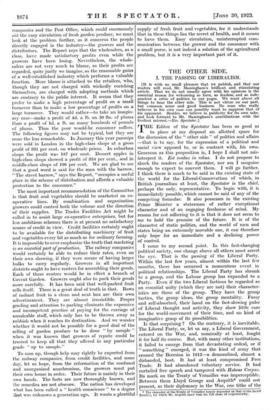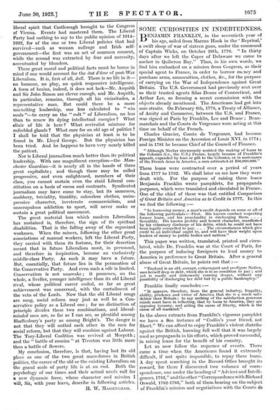THE OTHER SIDE.
I. THE PASSING OF LIBERALISM.
[It is with no small pleasure that we publish, and that our readers will read, Mr. Massingham's brilliant and stimulating article. That we do not usually agree with his opinions is the essential reason for welcoming so keen, so fearless, and so inde- pendent a critic of politics to our pages. We want above all things to hear the other side. This is not virtue on our part, but common sense and good business. No man who really believes in his own case can possibly want to suppress that of his opponent. Besides, we believe in publicity for its own sake, and look forward to Mr. Massingham's contributions with the liveliest interest.—En. Spectator.] THE Editor of the Spectator has been so good as to place at my disposal an allotted • space for the discussion of the " other side " of politics and affairs —that is to say, for the expression of a political and social view opposed to, or in contrast with, his own. Generous as this proposition is, I hope I shall not mis- interpret it. Est modus in rebus. I do not propose to shock the readers of the Spectator, nor am I sanguine enough to expect to convert them. I will go further. I think there is much to be said in the existing state of the world for the Liberal-Conservatism of which, in British journalism at least, the Spectator is the chief, perhaps the only, representative. To begin with, it is immediately possible, which cannot be said of any of the competing formulae. It also possesses in the existing Prime Minister a statesman of rather exceptional character and of an engaging freshness of mind. My reason for not adhering to it is that it does not seem to me to hold the promise of the future. It is of the character of static politics, and the world of men and states being an extremely movable one, it can therefore only hope for an immediate and a declining power of control.
I come to my second point. In this fast-changing political society, one change above all others must arrest the eye. That is the passing of the Liberal Party. Within the last few years, almost within the last few months, there has occurred a momentous event in political relationships. The Liberal Party has shrunk to a group, and the Labour group has expanded to a Party. Even if the two Liberal factions be regarded as an essential unity (which they are not) their character- istics are those of the group. They have the group tactics, the group ideas, the group mentality. Fussy and self-absorbed, their hand on the fast-slowing pulse of Liberal thought and activity, they show little care for the world-movement of their time, and no kind of imaginative grasp of its possibilities.
Is that surprising ? On the contrary, it is inevitable. The Liberal Party, or, let us say, a Liberal Government, entered on the War, and, nominally at least, fought it for half its course. But, with many other institutions, it failed to emerge from that devastating ordeal, or if " something " emerged, it was the kind of army that crossed the Beresina in 1812—a demoralized, almost a disbanded, host. It had at least compromised Free Trade. It had abandoned voluntary service. It had curtailed free speech and tampered with Habeas Corpus. Its mark on the Treaty of Versailles was imperceptible. Between them Lloyd George and .Asquith* could not present, as their diplomacy in the War, one tithe of the
• The character of the Treaty of Versailles largely depended on that of the Secret Treaties, for which Mr. Asquith must bear his 'full share of responsibility.
liberal spirit that Castlereagh brought to the Congress of Vienna. Events had mastered them. The Liberal Party had nothing to say to the public opinion of -1914- 1922, for of the one or two Liberal policies that had survived—such as woman suffrage and Irish self- government—the first was an act of common consent, while the second was extracted by fear and necessity, accentuated by blunders.
These great moral and political facts must be borne in mind if one would account for the etat d'dme of post-War Liberalism. It is, first of all, dull. There is no life in it— no humour, no play, no quick responsive intelligence. A form of brains, indeed, it does not lack—Mr. Asquith and Sir John Simon are clever enough, and Mr. Asquith, in particular, remains, through all his vicissitudes, a representative man. But could there be a more unexciting leadership, one less calculated to " win souls "—to carry on the " cult " of Liberalism, no less than to renew its dying intellectual energies ? What elixir of life is here ? What revivalist mixture for enfeebled glands ? What cure for an old age of politics ? I shall be told that the physician at least is to be found in Mr. Lloyd George. But the physician has been tried. And he happens to have very nearly killed the patient.
Nor is Liberal journalism much better than its political leadership. With one magnificent exception—the Man- chester Guardian—it is nearly all in the hands of three great capitalists ; and though these may be called progressive, and even enlightened, members of their class, you cannot sustain even the staid Liberal con- stitution on a basis of cocoa and contracts. Syndicated journalism may have come to stay, but its sameness, snobbery, triviality, timidity, colourless clothes, unim- pressive character, inveterate commercialism, and unscrupulous addiction to sport, will never make or sustain a great political movement.
The great material loss which modern Liberalism has sustained is, therefore, the sign of its spiritual disabilities. That is the falling away of the organized workmen. When the miners, following the other great associations of manual workers, left the Liberal Party, they carried with them its fortune, for their desertion meant that in future Liberalism must, in personnel, and therefore in inspiration, become an exclusively middle-class- Party. As such it may have a future.
But, essentially, that future lies in the permeation of the Conservative Party. And even such a role is limited.
Conservatism is not unawake ; it possesses, on the whole, a livelier, younger intelligence than its old Liberal rival, whose political career ended, so far as great achievement was concerned, with the curtailment of the veto of the Lords. Now that the old Liberal songs are sung, social reform may just as well be a Con- servative policy as a Liberal one ; for no distinction of principle divides these two combinations, and liberal- minded men are, so far as r can see, as plentiful among Shaftesbury's party as among Bright's. The danger is not that they will outbid each other in the race for social reform, but that they will combine against Labour. The Tory-Liberal Coalition was revived at Morpeth and the " battle of cousins " at Tiverton was little more than a battle of flowers.
My conclusion, therefore, is that, having lost its old place as one of the two great mass-forces in British politics, the career of the old or the existing Liberalism on the grand scale of party life is . at an end. Both the psychology of our times and their actual needs call for a new dynamic force, whose character and mission I will, Sir, with your leave, describe in following articles.
IL W. MASSINGHAM.











































 Previous page
Previous page